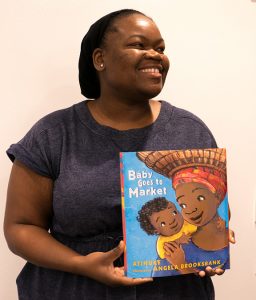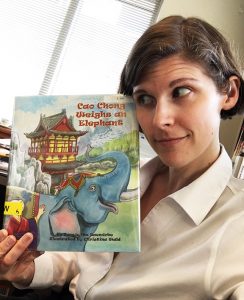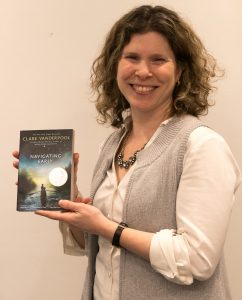This blog was guest authored by Candice Price, Elizabeth Bird, and Rebecca Goldin.
You can sometimes find great summer reading in places you weren’t expecting! Check out these recommendations for books that engage and entertain while helping kids make friends with math.
The Mathical Book Prize recognizes math-inspiring fiction and non-fiction for youth ages 2–18. The prize is awarded by the Mathematical Sciences Research Institute (MSRI), in partnership with the National Council of Teachers of English (NCTE) and the National Council of Teachers of Mathematics (NCTM), and in coordination with the Children’s Book Council (CBC).
Below we highlight three Mathical honorees from 2018:

Baby Goes to Market by Atinuke, illustrated by Angela Brooksbank
2018 Mathical Winner, PreK
Reviewed by Candice Price
This is a great book that explores counting in a fun way with African culture as the background. I had the pleasure of reading this book for the first time with my three-year-old niece. She loved it! She loved the story about a hungry, sweet little baby who, unbeknownst to his mother, receives several treats from people at the market while she carries him wrapped around her back. There was a pure delight in my niece’s eyes as she counted up the treats in the basket as the baby added them to the basket. She also enjoyed subtracting the treats that the baby ate.
All of this is presented in beautiful illustrations by Angela Brooksbank, which showcase parts of African culture with bright colors and beautiful patterns. My niece asks me to read it whenever I come over. I recommend it for any family. . . my family loves it!
Candice Price is a member of the Mathical Book Prize selection committee and assistant professor of mathematics at the University of San Diego.
 Cao Chong Weighs an Elephant by Songju Ma Daemicke, illustrated by Christina Wald
Cao Chong Weighs an Elephant by Songju Ma Daemicke, illustrated by Christina Wald
2018 Mathical Honor Book, Grades 1–2
Reviewed by Elizabeth Bird
As many a teacher will tell you, a good way to make mathematics comprehensible to small kids is to place it in a realistic context. Using pizza slices to discuss fractions, say, or fingers for counting. And then, every once in a while, a kid’s gonna want to know how to weigh their elephant. Happens to the best of us. You have a great big elephant and no way of knowing how heavy it is. How do you solve this problem?
In Songju Ma Daemicke and Christina Wald’s downright delightful book, the principles of buoyancy and patient pachyderms come into play. There aren’t a lot of child prodigies in history, but Cao Chong is one of the few. Alive during the Han dynasty, the boy genius encounters a unique problem. The prime minister’s elephant is in need of a weighing, but how do you go about it without a scale? In this fictionalized retelling, kids get a front row seat to the sticky situation.
Turn to the end of the book and you can also take advantage of back matter like ideas for teachers and parents using inquiry-based learning. This won’t be the last picture book you see explaining the principle of buoyancy, but it may well be the best. For the mini mathematically-minded and their elephant-loving kin.
Elizabeth Bird is collection development manager, Evanston Public Library system, former youth materials specialist, New York Public Library, and reviewer for Kirkus and The New York Times.
 Navigating Early by Clare Vanderpool
Navigating Early by Clare Vanderpool
2018 Mathical Honor Book, Grades 6–8
Reviewed by Rebecca Goldin
Navigating Early is a beautiful and unusual story of a friendship between two boys at a boarding school in Maine toward the end of World War II. Their friendship centers around each boy’s individual story of loss, pain, and growth during a historically tumultuous time. The book provides a casual affirmation of the use of “proof” and “exploration” in the pursuit of a mathematical passion.
One of the boys views his life’s trajectory and calling through the expansive digits of pi, creating a fantastical storyline that drives an unexpected adventure through the wilderness in search of a lost brother. The other boy’s emotional growth carries him into the wilderness as well, as he searches for his personal strengths and values and struggles against his feelings of isolation.
The book’s poetic language creates a vivid and stunning picture of the physical surroundings, while painting truths of these boys’ emotional lives that ring universal and yet immensely personal. As the two boys embark on their climactic adventure motivated by the first boy’s story about the number pi and the second boy’s desire for personal redemption, interwoven truths unfold through a captivating and convincing story.
Rebecca Goldin co-chairs the Mathical Book Prize selection committee. She is professor of mathematical sciences at George Mason University and the director of STATS, dedicated to improving statistical literacy in journalism.

